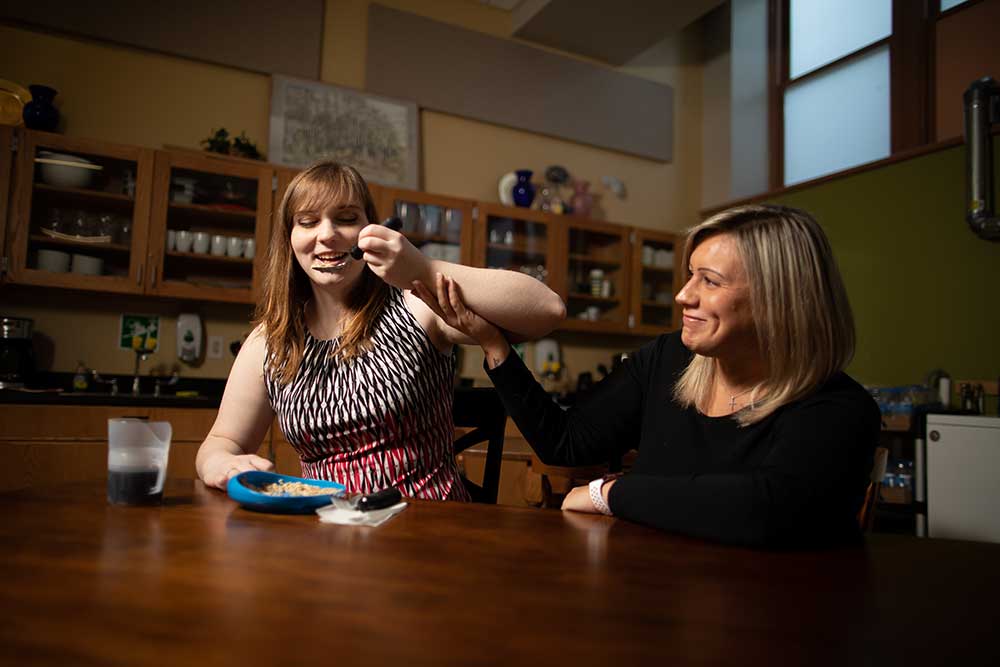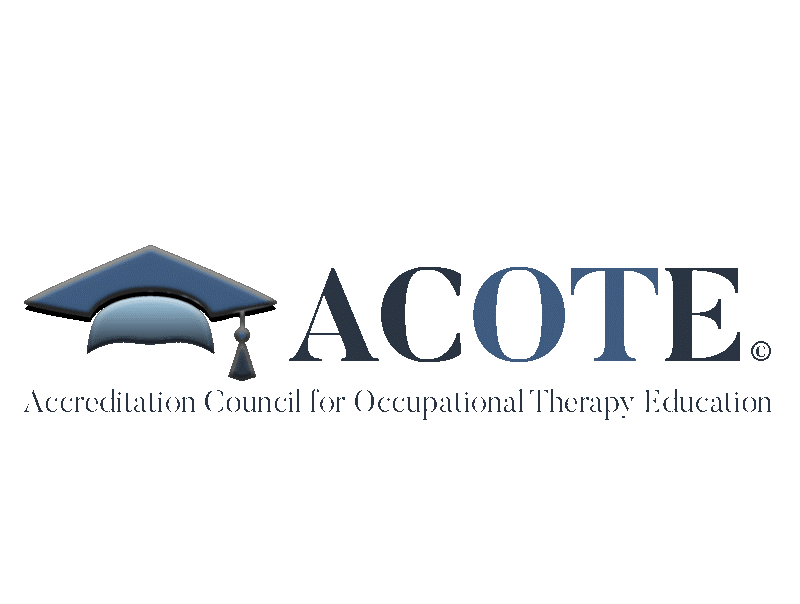
Occupational Therapy Assistant
At A Glance
Associate in Science degree program combines classroom-based education with fieldwork experience.
Graduates can work as an entry-level occupational therapy assistants.
The field is booming with job opportunities expected to grow by 34% from 2020 to 2030.
Graduates can earn between $23,860 and $61,960, depending on experience and industry.
Available at the Scranton campus.

Welcome to Occupational Therapy Assistant-Associate Degree
If you want to help people develop, recover, improve and maintain skills needed for daily living, becoming an Occupational Therapy Assistant may be your calling. Lackawanna’s program prepares students to work under the supervision of an occupational therapist ensuring a client’s valued daily activities are developed.
Your Career Starts Here
The Occupational Therapy Assistant career is expected to grow rapidly over the next 10 years by 25%, which means trained professionals are needed. With an associate degree, graduates can work under the supervision of occupational therapists in a variety of medical settings.

More About the Program
The program’s objectives are consistent with curriculum content and expectations set forth by the Accreditation Council for Occupational Therapy Education (ACOTE). Upon completion of Lackawanna’s program, students will be able to:
- Deliver client-centered practice using evidence-based research to support clinical decisions under the direction and supervision of occupational therapist.
- Demonstrate the distinctive nature of occupational therapy and the impact occupation has on health, well-being and quality of life.
- Demonstrate leadership and professional identity through a commitment to lifelong learning, service competency and advocacy for the profession.
- Demonstrate mastery of the knowledge, skills and attitudes required to pass the NBCOT certification exam.
The Occupational Therapy Assistant Program’s mission is to prepare students to become generalist occupational therapy assistants who value life-long learning, seek evidence to support their practical and clinical decisions, and place their clients at the center of their practice. As a result of completing the Occupational Therapy Assistant Program, these future occupational therapy practitioners will be equipped to work with the supervision of occupational therapists in a variety of settings, with a diversity of people, populations and communities. Confident in their entry-level skills, they will make a positive impact on the health, well-being, and quality of life of their clients by increasing their ability to participate as fully as possible in their preferred and needful daily activities, also known as occupations.

The Course Work
The two-year program prepares students to become generalist occupational therapy assistants who value life-long learning, seek evidence to support their practical and clinical decisions, and place their clients at the center of their practice.
Some of the course work students typically encounter include:
- General Biology
- Anatomy & Physiology
- Psychopathology
- Fieldwork
- Occupations Across the Lifespan
- Psychology
Additional Information
The associate-degree-level occupational therapy assistant program is accredited by the Accreditation Council for Occupational Therapy Education (ACOTE) of the American Occupational Therapy Association (AOTA), located at 6116 Executive Boulevard, Suite 200, North Bethesda MD 20852-4929. ACOTE’s telephone number c/o AOTA is (301) 652-AOTA and its web address is www.acoteonline.org Graduates of the program will be eligible to sit for the national certification examination for the occupational therapist assistant administered by the National Board for Certification in Occupational Therapy (NBCOT). After successful completion of this exam, the individual will be a Certified Occupational Therapy Assistant (COTA). In addition, all states require licensure in order to practice; however, state licenses are usually based on the results of the NBCOT Certification Examination. Note that a felony conviction may affect a graduate’s ability to sit for the NBCOT certification examination or attain state licensure.
Graduates of the program will be eligible to sit for the national certification examination for the occupational therapist assistant administered by the National Board for Certification in Occupational Therapy (NBCOT). After successful completion of this exam, the individual will be a Certified Occupational Therapy Assistant (COTA). In addition, all states require licensure in order to practice; however, state licenses are usually based on the results of the NBCOT Certification Examination. Note that a felony conviction may affect a graduate’s ability to sit for the NBCOT certification examination or attain state licensure. Before applying for the OTA program, you can contact NBCOT® for information on their early determination program to assess examination eligibility. Go to NBCOT and read the “Early Review” section for details.
NOTE: Students must complete 16 weeks of Level II Fieldwork within 16 months following the completion of the didactic portion of the program, and must not exceed the overall limit of 36 months required to complete the program.
The potential impact of a felony conviction on a graduate’s eligibility for certification and credentialing (PDF) – OTA-Students-with-Criminal-Backgrounds.pdf
OTA Admissions Process And Criteria
- Lackawanna College Application (may be completed online or via mail)
- Applicants to the OTA program must submit proof of high school or GED completion with an official high school transcript or GED equivalent.
- Lackawanna College will determine the applicant’s current academic ability based on a combination of the following:
- SAT or ACT test scores, if applicable
- College Transfer Credits
- If transferring credits from another college/university, official college transcripts are required. Transfer credits must be at least a letter grade of C or greater to meet academic standards.
- Placement Test (Accuplacer)
- Applicants without valid SAT/ACT scores and who have not previously earned college credits will be required to take the ACCUPLACER exam for determination of current academic ability. Applicants must achieve ‘College Ready’ scores in Reading, Writing, and Math to be considered qualified for the OTA Program.
- Should a student need one or move developmental or introductory courses based on placement scores, the needed classes would have to be completed prior to entry into the initial academic term for the OTA program. If not completed prior to the initial academic term, the student would not be eligible to proceed into the OTA program but would be eligible to reapply for the following year.
- Evidence of Academic Ability
- Students interested in and applying to the OTA Program must demonstrate the ability of completing this rigorous program with evidence of previous academic success in studying the Sciences. This can be done one of three ways:
- The student has completed Biology, Chemistry, or Anatomy and Physiology in high school within the past three years with a passing grade of C or better. An official high school transcript must be sent to Lackawanna College as evidence.
- The student has completed a three (3) or four (4) credit college level course in Biology, Physics, Chemistry, or Anatomy and Physiology with a passing grade of C or better. An official college transcript must be sent to Lackawanna College as evidence.
- If neither of the above scenario applies, a student must enroll in a college level Biology, Physics, Chemistry or Anatomy and Physiology course before applying to the OTA Program. If a student is currently enrolled in this course while in the process of applying to the OTA Program, the student may receive probationary acceptance while completing this course. Evidence by way of an official college transcript must be received confirming completion of the course with a grade of C or better for official entry into the Spring semester of the OTA Program. Should the applicant either not complete the course or not receive the requisite grade, he or she will then forfeit the seat within the OTA Program.
- Please note that the Lackawanna College OTA program has a minimum requirement of a 2.5 GPA for consideration into the program.
2. Complete the Occupational Therapy Assistant Application
- Download the OTA Program Application (PDF) – Lackawanna-OTA-Program-Application-Interactive-July-2021.pdf
3.Proof of 20 observation hours total, in two settings.
- Download the OTA Observation Form (PDF) – Lackawanna-OTA-Observation-Form-Interactive-October-2020.pdf
4. Three professional references.
- Download the Professional Reference Form (PDF) – Lackawanna-OTA-Professional-Reference-Interactive-October-2020.pdf
5. Interview and writing prompt
- Applicants whose materials are satisfactory will be invited for an interview with the OTA program director and/or the academic fieldwork coordinator.
References should either submit their completed Reference Form to OTAadmissions@lackawanna.edu or mail them to:
Lackawanna College – Admissions Department
Occupational Therapy Assistant Program
501 Vine Street
Scranton, PA 18509
Note: Submitting application materials does not guarantee an interview invitation. An interview invitation does not guarantee acceptance into the OTA Program. Further, each applicant’s materials, interview, and writing prompt will be assessed using a scoring rubric designed to objectively determine an applicant’s fitness for the OTA program.
Transfer of College Courses and AP Credits into the OTA Program
Students may transfer in college credits for the following OTA program courses if the course grade meets the minimum requirements set forth by the OTA Program and only if accepted by the College for direct transfer. Please contact the OTA Program Director for full requirements for transfer of the following courses:
- College Writing (3 credits)
- Effective Speaking (3 credits)
- College Algebra (3 credits)
- Introduction to Psychology (3 credits)
- General Biology I with Lab ( 4 credits)
- Anatomy & Physiology I with Lab (4 credits)
- Anatomy & Physiology II with Lab (4 credits)
- Abnormal Psychology (3 credits)
All other courses within the OTA program curriculum and designated with the course code initials (OTA) must be taken within the Lackawanna College OTA program and are not eligible for transfer.
OTA Program Acceptance Of AP Credits
Lackawanna College’s policy on accepting Advanced Placement courses for college credit is as follows:
AP and CLEP exams will be reviewed for possible transfer credit once the Registrar’s office receives an official score report directly from College Board.
*Transfer evaluation of Occupational Therapy Assistant curriculum candidates are based upon criteria specified in program guidelines and according to program-specific accreditation standards.
If AP scores are accepted by the Registrar for college credit, the OTA Program will accept the credits for the following courses (within the last 3 years):
- ENG 105 College Writing
- MAT 120 College Algebra
- PSY 105 Introduction to Psychology
- BIO 120 General Biology
Lackawanna’s Tuition & Fee Pricing | Lackawanna College
2023-2024 academic year based on a 3% increase. Fees are subject to change.
| Current Cost | OTA Program 2022 Fall Semester | OTA Program 2023 Spring Semester | OTA Program 2023-2024 Academic Year | Total Cost of OTA Program (2 Year Program) |
|---|---|---|---|---|
| Tuition | 8,225 | 8,225 | 16,950 | 33,400 |
| Student Fee | 620 | 620 | 1,640 | 2,880 |
| Books & Supplies | 750 | 750 | 1,600 | 3,100 |
| Loan Fees | 56 | 56 | 140 | 252 |
| Transportation | 675 | 675 | 1,400 | 2,750 |
| Total | 10,326 | 10,326 | 21,730 | 42,382 |
Graduation Rate
The total number of graduates from the OTA program during the 3-year period 2020-2022 (most current) was 22, with an overall graduation rate of 72%.
| Graduation Year | Students Entering/Graduating | Graduation Rate |
|---|---|---|
| 2020 | 16 /10 | 63% |
| 2021 | 7 /6 | 86% |
| 2022 | 9 /6 | 67% |
| Total | 32 /22 | 72% |
NBCOT Exam Data
Program results from the National Board for Certification in Occupational Therapy (NBCOT) can be found online at the NBCOT National Certification Exam.
Contact:
Carrie Griffiths, OTD, OTR/L
OTA Program Director
griffithsc@lackawanna.edu
Curriculum Guide
Lackawanna College offers distance learning options for most general education courses. OTA coded courses are all offered in-person.
All Lackawanna College curriculum guides can be found on the Portal. Free-form Content – Main View | Academic Year 2022-2023 | Curriculum Guides | Portal (lackawanna.edu)
Important Links and Policies
Tuition and Fees – Lackawanna’s Tuition & Fee Pricing | Lackawanna College
Additional Program Fees (PDF) – Lackawanna-OTA-Additional-Fees-Dec-2020.pdf
Dismissal, Probation, and Suspension Policies (PDF) – Lackawanna-OTA-Dismissal-Probation-Suspension-Dec-2020.pdf
Graduation Requirements (PDF) – Lackawanna-OTA-Graduation-Requirements-Dec-2020.pdf
Grievance Policy (PDF) – Lackawanna-OTA-Grievances-Dec-2020.pdf
Program Health and Safety, Use of Equipment Policies (PDF) – Lackawanna-OTA-Program-Health-and-Saftey-Dec-2020.pdf
Withdrawal from the Course or the College (PDF) – Lackawanna-OTA-Withdrawal-from-Course-of-College-Dec-2020.pdf

Accreditation Council for Occupational Therapy Education (ACOTE)
6116 Executive Boulevard, Suite 200
North Bethesda, MD 20852-4929
(301) 652-6611
acoteonline.org
National Board for Certification in Occupational Therapy (NBCOT)
NBCOT – National Board for Certification in Occupational Therapy
